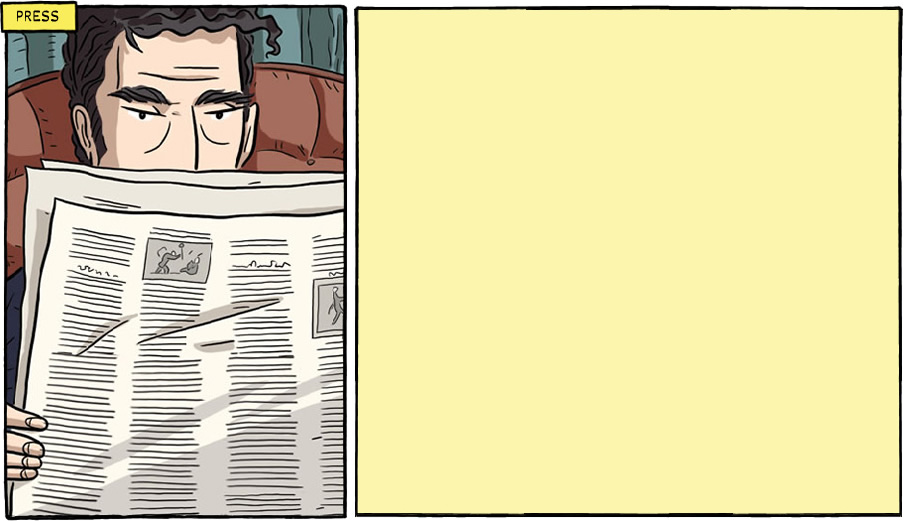
| Review in Comics Reporter |
| Written by by Beth Hewitt, COMICS REPORTER/GUTTER GEEK |
| Friday, 23 January 2009 15:00 |
|
Gutter Geek, a discontinuous review of graphic narrative By Beth Hewitt Apostolos Doxiadis, Christos H. Papadimitriou, and Alecos Papadatos, Logicomix (Bloomsbury, 2009); and Mark Schultz, Zander Cannon and Jevin Cannon, The Stuff of Life: A Graphic Guide to Genetics and DNA (Hill and Wang, 2008). My decision to review these two books together began innocently enough. Look, I thought, here are two new graphic novels that seem to explicate topics—genetics, molecular biology, and theoretical math—that seem otherwise inhospitable to narrative, to pictures, and certainly to fiction. I felt rather chastened, then, when at the beginning of Logicomix the author (metafictively portrayed within the comic’s very pages) chastises those who would imagine his book as a graphic “textbook” designed to explicate the complexities of mathematical logic and analytic philosophy. The Stuff of Life conversely explicitly declares this very project in its subtitle—“A graphic guide to genetics and DNA”—and clearly part of the aim of the title is classroom use. Similar to Larry Gonick’s Cartoon History series, The Stuff of Life narrates what is otherwise diagrammed into the arid taxonomies of secondary school textbooks. The difference, however, is that while history is already a narrative and easily amenable to graphic novelization (as is evident by the frequency with which comic writers turn to historical romance), Schultz’s topic seems fundamentally non-narrative (what could be less like a story than the double-helix structure of DNA?). Thus the challenge for Schultz is how to transform his topic into a captivating tale. Schultz takes a simple but also entirely effective tactic, which is to frame his novel as science fiction. The conceit is that a researcher from an alien species explicates earth’s evolutionary biology to his world’s ruler. What follows then is a remarkably entertaining, clear, and informative explanation of the structure of molecular biology, of cellular biology, and the consequences of such scientific discovery to medicine, criminology, and historical inquiry. The slender volume feels rich with information and I felt a smarter for reading it, and I’m certain that anyone who, like me, hasn’t been in a biology or chemistry classroom for, let’s say, 25 years, will feel likewise. Such a Hard-Subject-for-Dummies approach is one that Logicomix rejects out of hand, and the character Doxiadis represents in the comic’s pages admonishes his readers that his story will succeed or fail only insofar as it does or does not constitute a good story. That said, he nevertheless recruits Professor Christos Papadimitriou (who teaches theoretical mathematics at Berkeley) to, as he says, make certain that his story of the development of analytic philosophy does not go (technically) astray. More importantly, he incorporates his encounters with the mathematician into the very fabric of the story, which begins as the artists (Doxiadis himself, the illustrator, Alecos Papadatos, the colorist, Annie Di Donna, and the researcher and letterer, Anne Bardy) make their case for their comic to Christos. The narrative frame, in this way, is complex, weaving together the contemporary story of the comics’ creation, the story of Bertrand Russell’s lecture to an audience of pacifists protesting the United States’ entry into World War II, and, at the core, the bildungsroman of Russell’s quest towards and away from logical certitude. Despite Doxiadis’s exhortation that we take his novel as fiction—neither as a primer on logic nor as a real biography of Russell—one pleasure of the book is that it explicates its difficult subject matter so well. (Rarely, for example, have I encountered such a cogent explication of early Wittgenstein.) That said, the novel also succeeds in precisely the terms the authors mandate: it is a darn good story. Like Professor Papadimitriou, who midway through the book challenges his co-author’s investment in the “logic and madness theme,” I too was not as captivated by this particular leitmotif, which seemed a bit too much of a caricature in this nuanced novel—nor did the didactic statement of theme seem necessary. But this was a minor blemish in an otherwise spotless tale about the desire for absolute certitude as it reveals itself in this seminal moment in intellectual history. The art—with its clean-line style and gorgeous saturated colors—somehow seems to capture the novel’s implicit assessment that illustration (be it pictorial, linguistic, symbolic, or logical) can only ever be a map of the real, even as it also keeps us firmly grounded in a realistic portrait of both turn-of-the-20th century Europe and the 21st-century composition of the book itself. All of which is to say, if the book tries to map the ambiguous space between Russell’s ambitions for logical certitude and his recognition of the logical necessity of unanswerable questions, then Logicomix’s visual style captures this middleground between caricature and mimesis. The delicacy of the novel’s structure and argument reveals itself in the novel’s “Finale,” where our authors watch a performance of Oresteia and debate whether or not Russell’s “foundational quest” (which was also the original title of Logicomix) ought to be considered a tragedy. During this quarrel the professor and the illustrator, Alecos and Cristos, briefly meditate on the possibility of writing a “story of computers” focused on tragedy/heroic epic of Alan Turing. My hope is that this conversation was, in fact, a real one and that the group will put their considerable talents towards this next chapter of the foundational quest.
Comics Reporter review of Logicomix Follow-up: The Reboot And more happy follow-ups to earlier reviews. From the brilliant Apostolos Doxiadis, a Youtube documentary on the making of his mind-bending Logicomix (don’t forget to watch parts 2 and 3 also). Logicomix won’t be available in English translation until later early fall, but the documentary will have all good guttergeeks pre-ordering their copy right away. (Not nearly half as cool, but we also discovered an animation tie-in to The Stuff of Life which we discussed in the same review).
|




